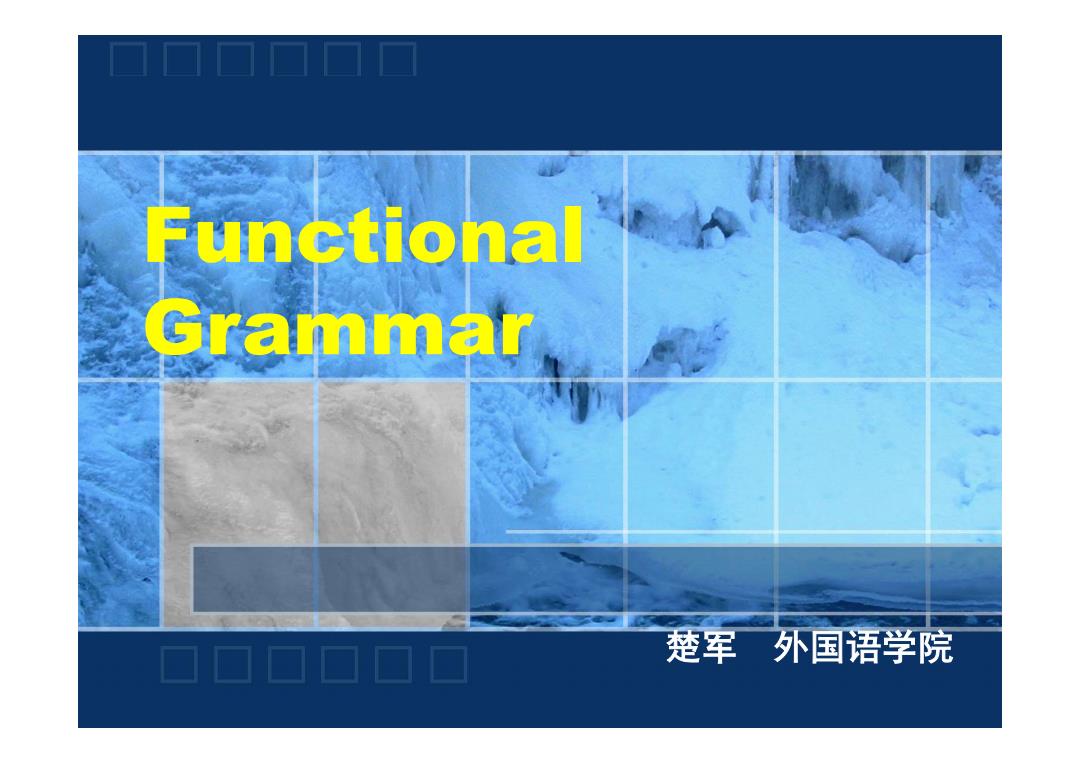
Functional Grammar 楚军外国语学院
楚军 外国语学院 Functional Grammar
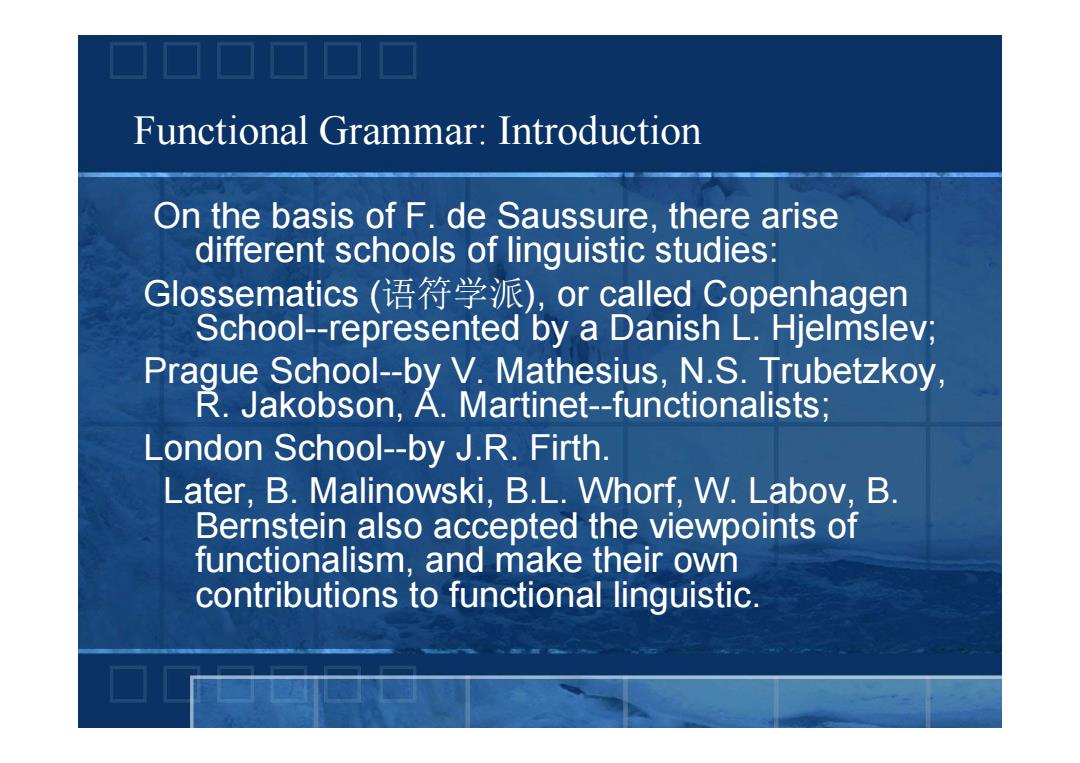
Functional Grammar:Introduction On the basis of F.de Saussure,there arise different schools of linguistic studies: Glossematics(语符学派),or called Copenhagen School--represented by a Danish L.Hjelmslev; Prague School--by V.Mathesius,N.S.Trubetzkoy, R.Jakobson,A.Martinet--functionalists; London School--by J.R.Firth. Later,B.Malinowski,B.L.Whorf,W.Labov,B Bernstein also accepted the viewpoints of functionalism,and make their own contributions to functional linguistic
Functional Grammar: Introduction On the basis of F. de Saussure, there arise different schools of linguistic studies: Glossematics (语符学派), or called Copenhagen School--represented by a Danish L. Hjelmslev; Prague School--by V. Mathesius, N.S. Trubetzkoy, R. Jakobson, A. Martinet--functionalists; London School--by J.R. Firth. Later, B. Malinowski, B.L. Whorf, W. Labov, B. Bernstein also accepted the viewpoints of functionalism, and make their own contributions to functional linguistic

Functional Grammar:Introduction M.A.K.Halliday(韩礼德),a linguist in Sidney University,inherited the traditions of Prague School,widely absorbed the thoughts and ideas of the ancesters and colleagues in linguistics, established his own 'Systemic-Functional Grammar'. Halliday approaches the functional relationship between language and society from angle of anthropology and sociology.He sees language as part of social semiotics,a social interaction and a tool of social communication. He stresses the function of language
Functional Grammar: Introduction M.A.K. Halliday (韩礼德), a linguist in Sidney University, inherited the traditions of Prague School, widely absorbed the thoughts and ideas of the ancesters and colleagues in linguistics, established his own 'Systemic-Functional Grammar'. Halliday approaches the functional relationship between language and society from angle of anthropology and sociology. He sees language as part of social semiotics, a social interaction and a tool of social communication. He stresses the function of language

Grammatical systems realizing semantic functions ldeational function is realized in transitivity system; interpersonal function in mood system, and textual function in theme system
Ideational function is realized in transitivity system; interpersonal function in mood system, and textual function in theme system. Grammatical systems realizing semantic functions
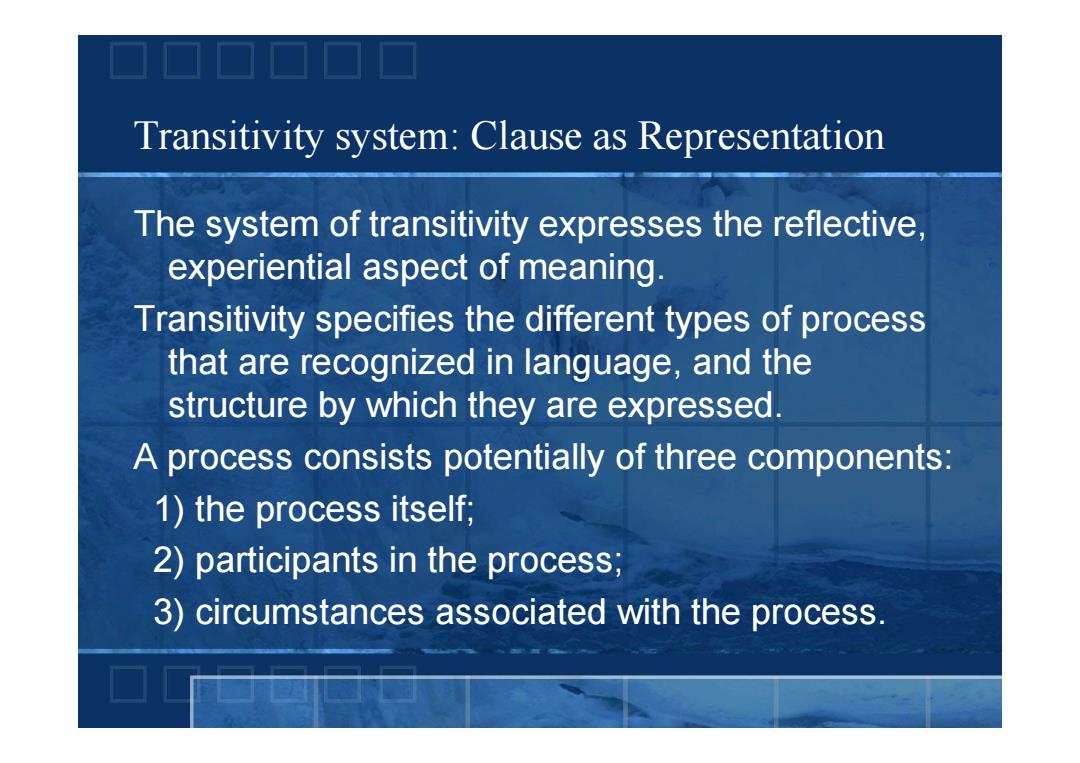
Transitivity system:Clause as Representation The system of transitivity expresses the reflective, experiential aspect of meaning. Transitivity specifies the different types of process that are recognized in language,and the structure by which they are expressed. A process consists potentially of three components: 1)the process itself; 2)participants in the process; 3)circumstances associated with the process
Transitivity system: Clause as Representation The system of transitivity expresses the reflective, experiential aspect of meaning. Transitivity specifies the different types of process that are recognized in language, and the structure by which they are expressed. A process consists potentially of three components: 1) the process itself; 2) participants in the process; 3) circumstances associated with the process
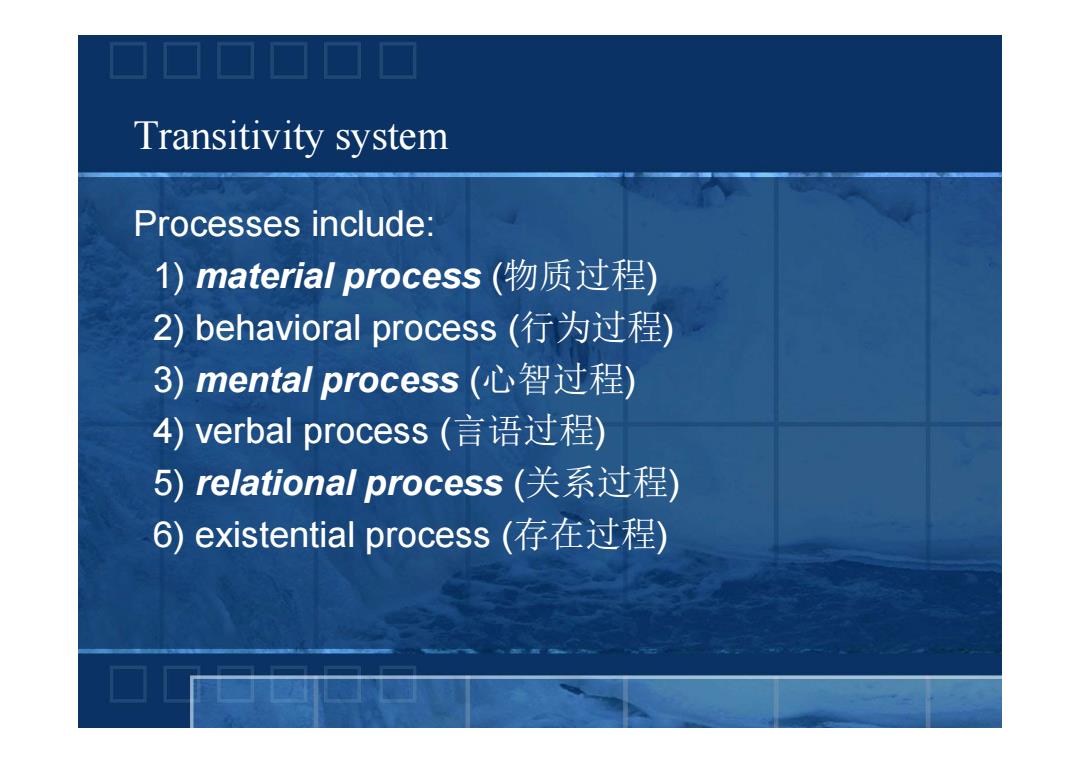
Transitivity system Processes include: 1)material process(物质过程) 2)behavioral process(行为过程) 3)mental process(心智过程) 4)verbal process(言语过程) 5)relational process(关系过程) 6)existential process(存在过程)
Processes include: 1) material process (物质过程) 2) behavioral process (行为过程) 3) mental process (心智过程) 4) verbal process (言语过程) 5) relational process (关系过程) 6) existential process (存在过程) Transitivity system
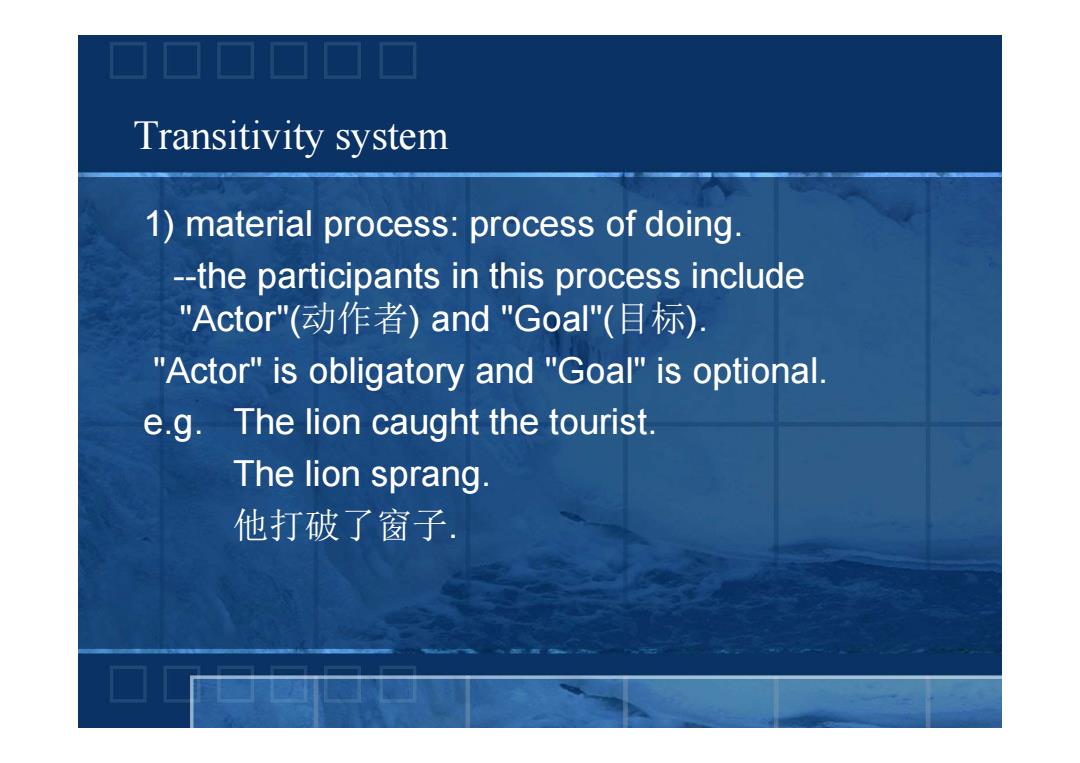
Transitivity system 1)material process:process of doing --the participants in this process include "Actor'"(动作者)and"Goal"(目标) "Actor"is obligatory and "Goal"is optional. e.g.The lion caught the tourist. The lion sprang. 他打破了窗子
Transitivity system 1) material process: process of doing. --the participants in this process include "Actor"(动作者) and "Goal"(目标). "Actor" is obligatory and "Goal" is optional. e.g. The lion caught the tourist. The lion sprang. 他打破了窗子

Transitivity system 2)mental process: --process of sensing,clauses of thinking, feeling and perceiving. In mental process,firstly there is always one participant who is human;this is the one that "senses"--feels,thinks or perceives. Secondly,the other main element which is felt, thought or perceived may be not only a "Thing", but also a "Fact
Transitivity system 2) mental process: --process of sensing, clauses of thinking, feeling and perceiving. In mental process, firstly there is always one participant who is human; this is the one that "senses"--feels, thinks or perceives. Secondly, the other main element which is felt, thought or perceived may be not only a "Thing", but also a "Fact
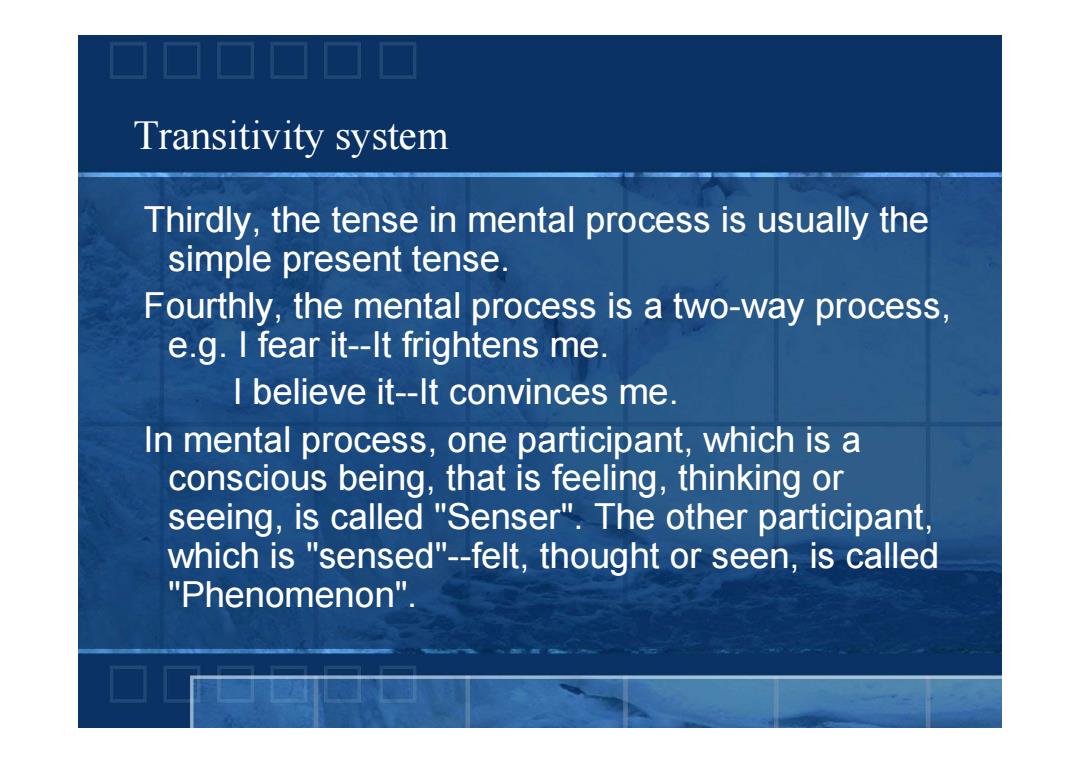
Transitivity system Thirdly,the tense in mental process is usually the simple present tense. Fourthly,the mental process is a two-way process, e.g.I fear it--It frightens me. I believe it--It convinces me. In mental process,one participant,which is a conscious being,that is feeling,thinking or seeing,is called "Senser".The other participant, which is "sensed"--felt,thought or seen,is called "Phenomenon
Thirdly, the tense in mental process is usually the simple present tense. Fourthly, the mental process is a two-way process, e.g. I fear it--It frightens me. I believe it--It convinces me. In mental process, one participant, which is a conscious being, that is feeling, thinking or seeing, is called "Senser". The other participant, which is "sensed"--felt, thought or seen, is called "Phenomenon". Transitivity system
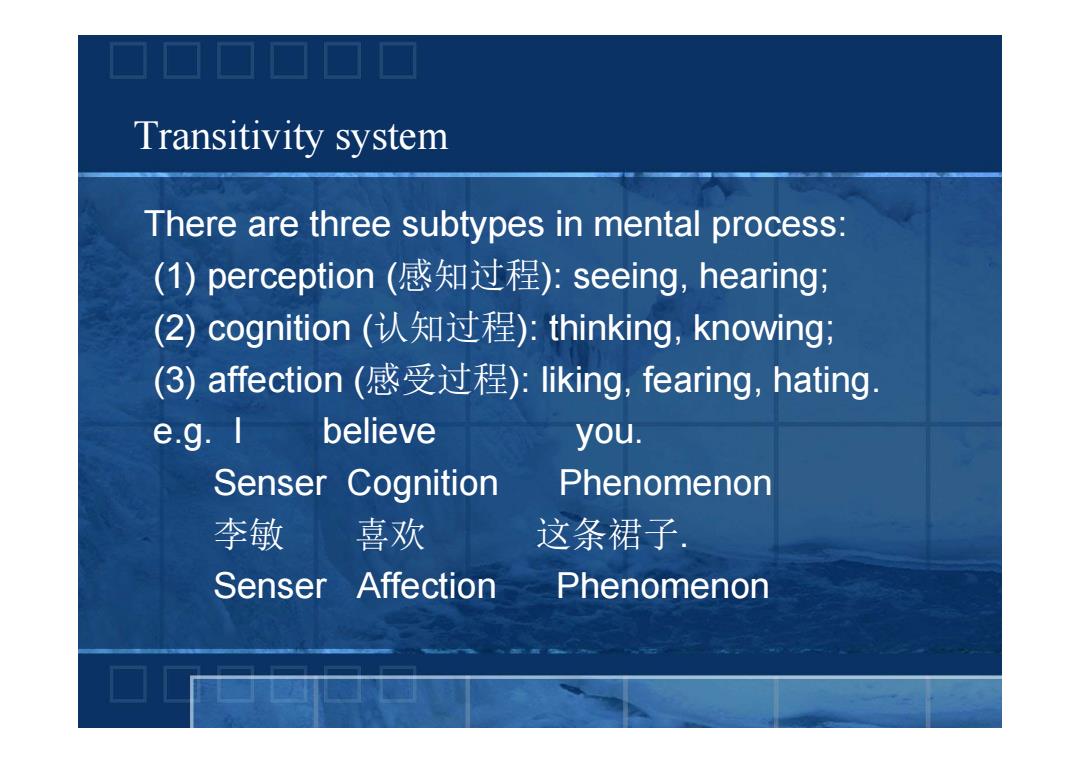
Transitivity system There are three subtypes in mental process: (1)perception(感知过程):seeing,hearing; (2)cognition(认知过程):thinking,knowing; (3)affection(感受过程):liking,fearing,hating. e.g.1 believe you. Senser Cognition Phenomenon 李敏 喜欢 这条裙子 Senser Affection Phenomenon
There are three subtypes in mental process: (1) perception (感知过程): seeing, hearing; (2) cognition (认知过程): thinking, knowing; (3) affection (感受过程): liking, fearing, hating. e.g. I believe you. Senser Cognition Phenomenon 李敏 喜欢 这条裙子. Senser Affection Phenomenon Transitivity system